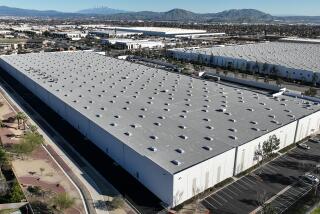Panel Asks State Safety Checks on Explosives Plants
SACRAMENTO — An advisory panel reviewing California’s explosives safety rules will recommend that the state take back authority to regulate working conditions in plants that make explosives under military contracts, the head of the panel said.
John Bobis, principal safety engineer for the state Occupational Safety and Health Standards Board and chairman of the advisory committee, said the panel will ask the standards board to eliminate an 8-year-old exemption that puts key areas of defense explosives plants off-limits to state job-safety inspectors.
“I think the exemption is dead,” Bobis said after a two-day meeting of the advisory committee this week in Sacramento. Bobis added, however, that the standards board--the rule-making branch of Cal-OSHA, the state job safety agency--could reject changes proposed by the advisory committee.
Suggested changes in the rules, which cover production and use of explosives in mining, construction and film-making, are scheduled to be considered by the standards board in March.
The exemption, adopted by the standards board in 1977, does not prevent state inspectors from checking non-manufacturing areas of defense plants or from inspecting all areas of explosives plants not working under military contracts.
State officials said the exemption was adopted because a branch of the U. S. Defense Department called Defense Contract Administration Services had already inspected the plants of defense contractors who handle explosives.
The Times reported last month that the exemption has prevented Cal-OSHA inspectors from investigating several serious accidents at explosives plants in the Santa Clarita Valley.
Some Cal-OSHA inspectors have questioned the effectiveness of the Defense Department safety program, and have argued that scrutiny by the military is compromised by its interest in getting explosives manufactured on time.
Federal safety officers inspect contractors’ plants four times a year, but the inspections are announced in advance. In addition, the Defense Department program relies primarily on contractors themselves to investigate the causes of accidents and to prescribe corrective measures.
Cal-OSHA conducts surprise inspections and investigates accidents itself.
Earlier this year, the exemption drew a protest from the federal Occupational Safety and Health Administration, which regulates job safety nationwide but has delegated its powers to 21 states, including California.
Federal officials told Cal-OSHA that the exemption may violate the agreement under which California took over the job of monitoring private industry job sites. As a result, Cal-OSHA agreed to consider eliminating the exemption.
At the advisory panel meeting held Tuesday and Wednesday, representatives of two defense contractors said the exemption is necessary to avoid conflicts between Cal-OSHA and Department of Defense safety regulations.
“We’re heavily regulated” by the Defense Department, said James Hess, a safety officer for Weber Aircraft Co. of Burbank. Hess said the defense program has stiff safety requirements and that a contractor is “in jeopardy of losing the contract ultimately if you do not comply.”
But Richard F. Jones, a senior safety engineer with Cal-OSHA, said state inspectors should also be able to check up on explosives manufacturing work. If the Defense Department’s safety program is so strong, Jones told industry officials, Cal-OSHA is “not going to cause you any problem.”
Gabe Gillotti, assistant regional administrator for federal OSHA, argued that Cal-OSHA had “exempted a certain segment of a certain industry” without determining that the workers were adequately protected.
No vote was taken on the issue during the two-day meeting. But Bobis, although defending the exemption himself, said later that the panel would ask the standards board to rescind it.
The advisory committee meeting was attended by about 20 representatives of government agencies and private firms that manufacture or use explosives. One labor union official also attended, but no explosives workers were there.
A final meeting of the advisory panel is scheduled for Dec. 5-6 at the Federal Building in downtown Los Angeles.
Bobis said that, after its review of the explosives rules in March, the seven-member standards board is tentatively scheduled to hold a public hearing on proposed rule changes in July.
The explosives rules are being studied under a 1980 state law that requires state agencies to conduct a one-time review of all their administrative regulations. Under the law, all state rules are to be reviewed for necessity, clarity and consistency with other regulations.
More to Read
Sign up for Essential California
The most important California stories and recommendations in your inbox every morning.
You may occasionally receive promotional content from the Los Angeles Times.










